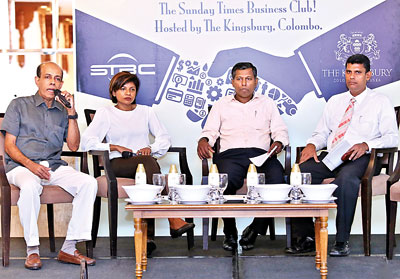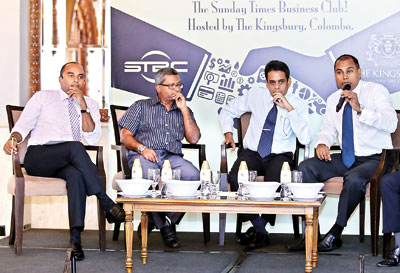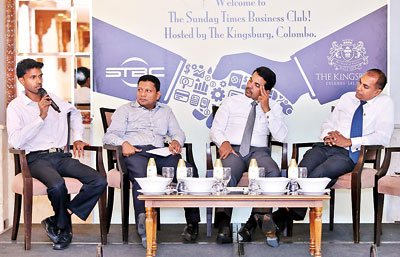Energetic STBC members articulate views on national issues in out-of-the box event
View(s): There was a burst of energy as members of the Sunday Times Business Club (STBC) took turns in serving as panellists in four different discussions on Tuesday at the Kingsbury Colombo, articulating their own views and solutions on a range of national issues.
There was a burst of energy as members of the Sunday Times Business Club (STBC) took turns in serving as panellists in four different discussions on Tuesday at the Kingsbury Colombo, articulating their own views and solutions on a range of national issues.
The event: The STBC’s monthly meeting which normally takes the form of a high-powered panel discussion of experts on a particular topic or a highly-ranked guest speaker.
Tuesday March 28 was different. Instead of inviting external experts, the club – in an out-of-the-box approach – decided to have four short panel discussions on four different topics with four members of the club serving on the panel, at different times.
Also aimed at team building, helping get on stage and address an audience, and presenting views on the topic on-the-spot, panel members were picked through a transparent process of selection – names of all members put into four boxes of the topics and four names each picked from the boxes. There were 16-17 panellists including three guests.
The topics for each 20-minute discussion were: (A) Is the environment conducive for foreign investments in Sri Lanka? (B) Are daily protests in the city bad for business and inconvenience the public? (C) Challenge between work and family time. Are Sri Lankans spending enough time with their families given today’s busy lifestyles? (D) Traffic chaos in the city and any solutions to ease the congestion.
One of the invited guests, who declined to be named since he is a public official, said that due to the traffic congestion in the city, many exporters have said they are reluctant to come to Colombo because they waste valuable time on the roads.
Protestors take to the streets as last resort

From left: Priyal Perera, Ms. Dinithi Somaratne, Sanjeewa Samaranayake and Shantha Dias Gunaratne
Below is a synopsis of the views presented in panel B on daily protests.
Priyal Perera : There is a certain level of inconvenience to the public and also reflects a sense of indiscipline when protestors block roads and bring traffic to a standstill. However such protests happen only after the protestors have failed at negotiations and all other options. Thus the Government needs to resolve these issues well in advance.
Dinithi Somaratne: Protests are a reflection of a democratic society and mainly based on some injustice to a section of society. Inevitably people are inconvenienced but protests are a healthy form of agitation in any society.
Sanjeewa Samaranayake: Protests are bad for business and inconvenience the public. Just imagine the plight of a parent taking a very-ill child to hospital and the road is blocked by protestors? The child can die but are protestors concerned. While we talk about the rights of people to protest, what about the rights of others who are inconvenienced? Don’t they have rights too? Protests should be confined to a particular location that could least impact on the public.
Shantha Dias Gunaratne: Why do people take to the streets? They do as a last resort. They feel their voice hasn’t been heard by the authorities. While people have a right to raise their voice in protests, others have a right to be able to move on the streets and roads without hindrance. Street protests are like problems faced in the workplace. If not solved early, workers strike.

From Left :Ravinash Perera, M.Z.M Shamil, Rehan Kulatilake and Nishan K. Silva
Too many vehicles, pedestrians also at fault
Views of panel D on traffic chaos in the city:
Nishan K. Silva: There is a need to assess vehicle imports, road infrastructure and traffic flows. There are too many vehicles on the roads and owning a vehicle has become a status symbol rather than a need. We need to think of car-pooling and restricting vehicle imports, a rule applied in many countries.
The reality is that more roads mean more vehicles. We will be fooling ourselves if we believe that more roads would reduce travel time. There is a need for the formation of a Cabinet sub-committee to review vehicle imports and road infrastructure.
Rehan Kulatillake: Bottlenecks at key junctions create more problems when police allow four lanes of traffic from two lanes. What then happens, just like the congestion on High level-Park road junction at Havelock Town, is that four lanes of traffic converge to a point where only two lanes can pass. The police need to more hands-on than create more problems instead of solving some. When vehicles are allowed to go on the wrong side of the road (opening four lanes from two), motorists are virtually encouraged to break the law.
M.Z.M. Shamil: I consider this issue in the context of where public institutions like schools, shops and offices are located. They are all on the main roads like Nugegoda town for example which is highly congested. Public schools and other institutions need to be away from the city and main roads. Another problem is that all parking slots in the city are grabbed by school vans which park the vehicles from morning till noon.
Ravinash Perera: Government alone cannot solve these problems. We need a combined solution with all stakeholders involved. For example there are now larger buses than before and also heavy vehicles like containers allowed at all times compared to earlier when they operated at restricted times. Buses should not come into big cities outside Colombo; instead these vehicles should be parked some distance away from main towns. Garbage collection is during morning hours amidst the traffic while 3-wheelers, which are a hindrance, should be phased out for small cars. Pedestrians are also at fault, crossing the road anywhere without using proper crossings.
Productivity a major issue in SL

From left: S. Rajiesh, Devapriya De Silva, Samantha Rathnayake and Nishan K. Silva
The views of panel C on balancing work and family are given below:
Nishan K. Silva: In my view, the keyword is productivity. Are Sri Lankans productive when half the year people are on holiday with the country having many holidays? We have dropped down in the global competitiveness index which is a reflection of where Sri Lanka is positioned globally. Telecommuting is a useful way of cutting time spent on roads.
Samantha Ratnayake: The work-life balance is an important part in the workplace in which a lot of research has been done. More studies are needed in the Sri Lanka context to understand these dimensions in terms of productivity and family time.
Devapriya De Silva : In most workplaces, senior executives work after hours and then have little time for their families. In such a case, children would be glued to TV and can go astray. We need to plan and prioritise our work day to ensure quality time with the family
S.Rajiesh: Are we globally competitive? How can we when we have so many holidays? Are we as competitive as Cambodia or Myanmar (our main competitors in garments)? One of the issues investors complain about is rigid labour laws which favour workers even if they are inefficient and incompetent. In some sectors, people are more relaxed at work which then helps in their family life. This is because some CEOs are compassionate and fair.

From left: Roshan Ranasinghe, Sean Baliah, Chaturanga Perera and Wasantha Ellawala
Inconsistent policies a deterrent, labour laws too rigid
Views of panel A on ‘is Sri Lanka conducive for investments’:
Roshan Ranasinghe: Sri Lanka is conducive for foreign investment although we are struggling to get investments. On the positive side, there is a stable government, GDP growth is good and the labour force is very literate with a level of English language competency. However the factors that don’t work in our favour are (a) inconsistencies in policies in various sectors, (b) labour laws are too rigid and pro-worker, and (c) other countries in the region are attracting more interest than Sri Lanka.
Chaturanga Perera: The question one needs to ask is; why should investors come to Sri Lanka? Do the systems work here? For example there are long delays in court cases (due to lack of resources) and the same lack of resources is seen at the Registrar of Companies where getting something done takes days. There is too much bureaucracy and when systems are slow and takes time, it’s not an incentive to invest.
What is important is that there should be a national policy on investment and taxes which doesn’t change irrespective of a new political party being elected. Consistency and continuity is the key to attracting investments.
Vasantha Ellawala: The environment is not at all conducive to investments and Sri Lanka is not competitive in the global context. Policies should be consistent and not subject to change. For example the recent changes in tax laws where refunds have been brought back will cause many issues.
Shaun Baliah: I have mixed feelings on this issue. Most of the investments coming in are in hotels and real estate, both of which are unsustainable. There is a decline in manufacturing investments which are more sustainable developments. While there is a shortage of labour, Sri Lanka is also being uncompetitive in labour as the driving force to attract investments. Unlike Malaysia or Vietnam, we don’t have enough trade pacts with other countries. The depreciating rupee is also a disincentive to investment. On the other hand, the country has a lot of potential and one way to make the approvals process easier is to have a one-stop-shop approvals mechanism.


